disciplinary policy and procedure - NASUWT
disciplinary policy and procedure - NASUWT
disciplinary policy and procedure - NASUWT
- No tags were found...
Create successful ePaper yourself
Turn your PDF publications into a flip-book with our unique Google optimized e-Paper software.
CONTENTS 1. Introduction2. Scope of the Procedure3. Core Principles4. Management of Employees5. Allegations of a Serious Nature6. Misconduct <strong>and</strong> Gross Misconduct7. Suspension8. Stages of the Disciplinary Procedure9. Disciplinary Hearing10. Appeals against Disciplinary Action11. Record of Warnings12. Confidentiality13. ReviewApp 1 Disciplinary meeting/hearing structureOriginator: H. Ruddle 2
This is a grave breach of <strong>disciplinary</strong> which may be serious enough to end theemployment contract between SPTA <strong>and</strong> the employee making any further workingrelationship <strong>and</strong> trust impossible.Gross Misconduct would normally lead to dismissal or a final written warning, even incases of first incidents of Gross Misconduct.Examples of Gross Misconduct are outlined below. The list is not intended to beexhaustive or exclusive <strong>and</strong> there may be other incidents of Gross Misconduct of asimilar gravity which could result in dismissal.• Theft or Fraud• Falsification• Serious breaches of relevant professional Codes of Conduct• Refusal to register with m<strong>and</strong>atory professional bodies (including persistentfailure)• Failure in Duty of Care to protect pupils or young adults by placing them atsignificant risk• Physical violence or bullying• Unlawful discrimination or harassment• Serious <strong>and</strong> deliberate damage to property• Wilful refusal to follow reasonable instructions• Serious incapability at work brought on by alcohol or illegal drugs• Serious abuse of SPTA Internet Policy (e.g. in relation to accessing pornographicinternet sites or sending <strong>and</strong> receiving offensive or obscene material)• Bringing SPTA into disrepute• Serious misuse of SPTA facilities (e.g. telephone <strong>and</strong> the internet, including socialnetworking sites)• Causing loss, damage or injury through serious negligence7. SUSPENSIONIn certain cases, a period of suspension from work with full pay may be consideredwhilst the case is being investigated or before a <strong>disciplinary</strong> hearing is held. Duringany period of suspension, the employee remains in employment <strong>and</strong> will be on fullpay, including associated contractual benefits, without prejudice to the outcome ofthe investigation.SPTA HR must be consulted in all cases before a decision to suspend is taken.Suspension with pay should only be imposed after careful consideration <strong>and</strong> shouldbe reviewed to ensure it is not unnecessarily protracted. In all cases, the employeeshould be advised to seek assistance from their Trade Union.Examples in which suspension may be considered include:• Gross Misconduct cases• Where there are sound reasons to believe pupils / employees / property are at risk• Where it is believed that the continued presence of the employee might prejudiceenquiries or influence witnessesOriginator: H. Ruddle 6
• There are reasonable grounds for concern that evidence has been tampered with,destroyed or witnesses pressurised before the hearing• Where the allegations are so serious that dismissal for Gross Misconduct ispossibleWhere suspension is being considered, an interview with the employee should takeplace as soon as possible. In child protection cases, the LADO must be contacted inin accordance with local child protection <strong>procedure</strong>s.The employee will be notified in person of the decision to suspend <strong>and</strong> have the rightto be accompanied by a Trade Union representative or work colleague.The employee will receive written confirmation of the suspension. This confirmationwill include the reasons for the suspension, the date from which the suspension willoperate <strong>and</strong> details of any restrictions relating to their suspension. The employee willbe provided with an information contact during the period of their suspension. Therole of the contact is to provide information regarding the progress of theinvestigation.Suspension is a neutral act <strong>and</strong> not an assumption of guilt <strong>and</strong> is not considered a<strong>disciplinary</strong> sanction. Principal / Senior Leader’s may consider a temporaryredeployment as an alternative to suspension.8. STAGES OF THE DISCIPLINARY PROCEDURE8.1 Appointing the Investigating OfficerThe Principal / Senior Leader should verbally advise the employee of theallegation(s) made against them <strong>and</strong> advise them that an investigating officer hasbeen appointed to investigate the allegation(s). This should be confirmed to theemployee in writing.Where the matter of concern involves the Principal / Senior Leader, it is for a SPTADirector to determine who would be the most appropriate person to be appointed asthe investigating officer to deal with the matter.The investigating officer should be a person with no involvement whatsoever in thematter under investigation. This person should, wherever possible, be a senioremployee. The Principal / Senior Leader should not be the investigating officer,unless there are exceptional circumstances (e.g. a senior employee is the subject ofthe investigation, the senior employee may be required as a witness).The investigating officer’s brief is to establish the facts of the case by gatheringinformation. This can be in the form of witness statements, interviews <strong>and</strong> throughobtaining other relevant documents.Where the matter under investigation involves an allegation(s) of physical/sexualabuse <strong>and</strong> the Police or child protection agencies are involved, SPTA’s investigationmay have to be held in abeyance until the external investigation has beencompleted. Advice should be sought from SPTA HR.Originator: H. Ruddle 7
All investigations will be undertaken in the strictest of confidence. The employee <strong>and</strong>any other individuals interviewed as part of this process will be advised to treat theinvestigation as such.8.2 The InvestigationAs part of the investigation, a meeting should be arranged with the employee assoon as possible, giving a minimum of five working days’ notice in writing to theemployee, who will also be advised that they may be accompanied by a trade unionrepresentative or a colleague of their choice.At the meeting, the Investigating Officer should present the allegation(s) to theemployee who should be invited to respond in full <strong>and</strong> to any other informationsubmitted by the Investigating Officer.At any point during the meeting the employee may request a short adjournment toconsult their representative.If new allegations emerge during the course of the investigation, it will be necessaryto re-interview the employee or witness in seeking to establish the facts.The investigation should be conducted as soon as possible. Every attempt should bemade to complete the investigation in a timely manner <strong>and</strong> to expedite the process.The employee will be given regular information as to how the investigation isprogressing.As part of the investigation, the Investigating Officer will determine the appropriateaction <strong>and</strong> a written report should be prepared of the facts of the case which willinclude a list of every individual who has been interviewed, together with records ofinterviews, <strong>and</strong> any other evidence. These will be made available to all partiesshould a <strong>disciplinary</strong> hearing ensue.After the investigative process has been completed <strong>and</strong> the Investigating Officer hasconsulted with the appropriate SPTA HR Advisor, the employee must be informed assoon as possible in writing of the decision taken by the Investigating Officer.a) Take no further action under the <strong>disciplinary</strong> <strong>procedure</strong>In this instance, where the outcome is not to refer the matter to a <strong>disciplinary</strong>hearing, there should be a meeting with the employee to advise them of this decisionin person. The employee will also receive written confirmation of this decision.If the employee has been suspended <strong>and</strong> it is not intended to proceed with any formof <strong>disciplinary</strong> action, the suspension should be lifted immediately by the Principal /Senior Leader. The Principal / Senior Leader should meet the employee to discusstheir return to work. The employee will also receive written confirmation of thisdecision.b) Convene a <strong>disciplinary</strong> hearing before the Principal / Senior Leaderc) Convene a <strong>disciplinary</strong> hearing before a SPTA Director, in the following cases:Originator: H. Ruddle 8
• Where the Principal / Senior Leader cannot hear the case because theyhave prior knowledge of the case, or has acted as Investigating Officer or isrequired as a witness• Where the subject of the investigation is the Principal / Senior LeaderIf <strong>disciplinary</strong> action is to be taken, the Investigating Officer’s report will be madeavailable to all parties in the bundle of papers, prior to the <strong>disciplinary</strong> hearing. Thiswill be sent out with the <strong>disciplinary</strong> hearing invite letter.8.3 Support <strong>and</strong> assistanceOther than in the event of dismissal, the Principal / Senior Leader should ensure theopportunity for informal counselling. This could be used to give appropriateguidance, support <strong>and</strong> reassurance <strong>and</strong> to help rebuild, where necessary, anemployee’s confidence. There may also be a need for specific guidance <strong>and</strong>consideration may need to be given to other employment options, in consultationwith SPTA HR.9. DISCIPLINARY HEARING9.1 Notification of a <strong>disciplinary</strong> hearingShould the decision be taken to proceed to a <strong>disciplinary</strong> hearing, the employee willbe informed in writing providing at least ten working days’ notice of the hearing date.The written notification will contain the following information:• The mutually agreed date, time <strong>and</strong> venue of the <strong>disciplinary</strong> hearing• An outline of the allegations• The possible consequences• Copies of any relevant documentation (including the investigating officer’sreport)• The employee’s statutory right to accompaniment by either a workcolleague or trade union representative• All parties’ ability to produce any documents in evidence orreferences/testimonials to the investigating officer, at least five workingdays before the hearing takes place• The requirement for all parties to provide names <strong>and</strong> status of anywitnesses to be called at the same time as any documentary evidenceWhere the hearing date is postponed at the request of the employee or theirrepresentative, only one further hearing date will be arranged. The alternative dateshould be within five working days of the original hearing date. In the event of theemployee being unable to attend the second date arranged, the Principal / SeniorLeader may go ahead with the hearing in the employee’s absence based on theevidence available.9.2 Disciplinary hearing before the Principal / Senior LeaderThe <strong>disciplinary</strong> hearing will be carried out by the Principal / Senior Leader. In caseswhere the Principal / Senior Leader is the subject of the <strong>disciplinary</strong> action, the roleOriginator: H. Ruddle 9
An appeal panel composed of two SPTA Directors will hear any appeal against<strong>disciplinary</strong> action. In cases where the Principal / Senior Leader is the subject of theappeal hearing, the appeal hearing will be heard by an appeal panel composed oftwo SPTA Directors alongside the Chair of Governors. If SPTA Directors were usedat the original <strong>disciplinary</strong> hearing, it must be different SPTA Directors at the appealhearing. In all cases, SPTA HR will be also present.The appeal should be made in writing to the SPTA HR Advisor to the hearing withinten working days of the receipt of the written confirmation of the <strong>disciplinary</strong> hearing,clearly outlining the grounds of appeal.The Principal / Senior Leader may be invited by either side to attend the appealhearing as a witness.The employee will be informed in writing, providing at least ten working days’ noticeof the date of the appeal hearing.The written notification will include the following information:• The mutually agreed date, time <strong>and</strong> venue of the appeal hearing• A copy of the notes from the <strong>disciplinary</strong> hearing• Any new evidence <strong>and</strong>/or new witnesses to be presented/in attendance atthe appeal hearing• The employee’s right to accompaniment by either a work colleague ortrade union representative• All parties’ ability to produce any documents in evidence orreferences/testimonials at least five working days before the hearing takesplaceThe appeal panel will also receive copies of the above.The Principal / Senior Leader is responsible for ensuring a note taker is present atthe hearing to take formal notes.10.1 Action available to the appeal panelThe appeal panel may decide to:• Confirm the original decision• Uphold the grounds of appeal• Substitute a lesser penalty10.2 Notification of decisions made by the appeal panelWherever possible, the appeal panel will convey their decision verbally <strong>and</strong> thisdecision will be confirmed to the employee, in writing, not later than five workingdays after the hearing. This letter will also confirm that this decision is final <strong>and</strong> thereis no further right of internal appeal.Originator: H. Ruddle 11
11. RECORD OF WARNINGS A copy of the warning will be held on the personal file of the employee concernedfor:• First Warning – 6 months• Written Warning – 9 months• Final Written Warning – 12 monthsIn cases of Gross Misconduct, where a final written warning has been issued, <strong>and</strong> inthe opinion of the Principal / Senior Leader, the misconduct is so serious that itcannot be disregarded for future <strong>disciplinary</strong> or managerial purposes, then the finalwritten warning shall remain live for a longer period <strong>and</strong> the employee shall be soadvised. This facility shall only apply where the welfare, safety of a pupil, member ofthe public or fellow member of staff might be placed at risk. In such cases, theemployee may appeal to the appeal panel against the warning <strong>and</strong>/or against thedecision for the warning to remain live.Where no action is to be taken against the employee, no record of the investigationwill be kept on the employee’s personal file. However it would be kept in aconfidential file within the SPTA HR confidential files in accordance with the periodsspecified under the Data Protection Act.Where a formal sanction has been issued, a record should be kept on theemployee’s personal file until such time as the warning has expired. However, where<strong>disciplinary</strong> sanctions relate to the safety <strong>and</strong> wellbeing of children <strong>and</strong> youngpeople, records will be retained on the employee’s personal file permanently.In accordance with The Education (Teachers) Regulations 1993, where a person isdismissed from relevant employment on grounds of their misconduct (whether or notthey are convicted of a criminal offence) or they would have been dismissed, ordismissal was being considered, but for their resignation, the employer shall reportthe facts of the case to the Secretary of State.12. CONFIDENTIALITYAll investigations <strong>and</strong> any subsequent <strong>disciplinary</strong>/appeal hearings will be dealt within the strictest of confidence.The Principal / Senior Leader (or SPTA Directors) should not discuss a case withanyone other than a SPTA HR Advisor. Any issue of this kind should be referred tothe investigating officer.Where appropriate <strong>and</strong> following the conclusion of a case, the SPTA CEO, or theirrepresentative, will agree a statement which may be read out to relevant individualsto inform them briefly of the outcome of any hearing. There should not be adiscussion of the details of the case.Originator: H. Ruddle 12
13. REVIEW This <strong>policy</strong> will be reviewed every three years, or when there are changes to relevantlegislation.Originator: H. Ruddle 13
APPENDIX 1 – DISCIPLINARY MEETING/HEARING STRUCTURE1. IntroductionThe person chairing the meeting/hearing should:o Make reference to the <strong>disciplinary</strong> <strong>procedure</strong> under which themeeting/hearing has been arrangedo Provide an overview of the manner in which the meeting/hearing will beconducted (as outlined below)o Explain the requirement for confidentiality throughout the processo Introduce all persons present at the meeting/hearingo Explain the purpose of the meeting/hearingo Explain the nature of the allegation(s)2. Investigating Officer to present the <strong>disciplinary</strong> caseThe Investigating Officer will present the <strong>disciplinary</strong> case, including evidence fromwitnesses (where appropriate). Witnesses should submit their evidence <strong>and</strong> answerany questions put to them, before leaving the room.3. Questions to the Investigating Officer from panel <strong>and</strong> Employee/Representative4. Employee <strong>and</strong>/or their representative to present their caseThe employee <strong>and</strong>/or their representative will present their case, including evidencefrom witnesses (where appropriate). Witnesses should submit their evidence <strong>and</strong>answer any questions put to them, before leaving the room.5. Questions to the Employee <strong>and</strong>/or their representative from panel <strong>and</strong>Investigating Officer6. Final statement from the Investigating Officer7. Final statement from the Employee <strong>and</strong>/or their representative8. Investigating Officer <strong>and</strong> Employee <strong>and</strong> their representative leave the room whilstthe person chairing the meeting/hearing considers the matter.9. The person chairing the meeting/hearing considers the matter in consultation withother members of the panel (where relevant) <strong>and</strong> SPTA HR.10. All parties recalled to the room in order to hear the decision of the panel whichwill be delivered by the person chairing the meeting/hearing.The employee will be informed of the decision, any sanction to be imposed <strong>and</strong> itsduration, any improvement required <strong>and</strong> consequences of any failure to do so. Theemployee will also be informed of their right to appeal any <strong>disciplinary</strong> decision (withthe exception of an appeal hearing which is the final stage of the process).11. Decision confirmed in writing to the employeeOriginator: H. Ruddle 14


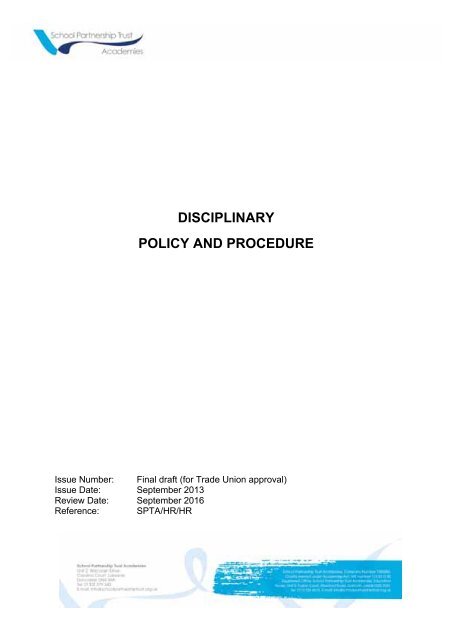
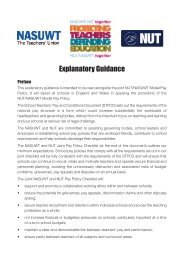
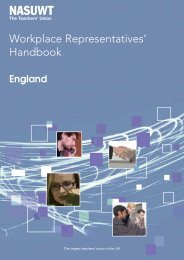
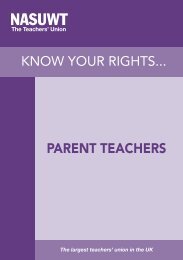
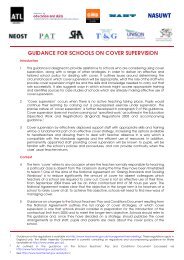
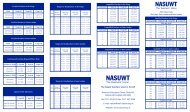
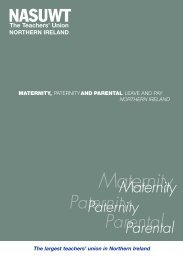
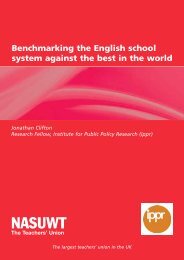
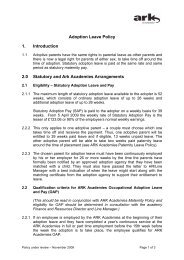
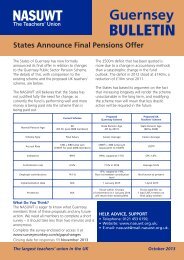
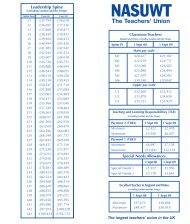

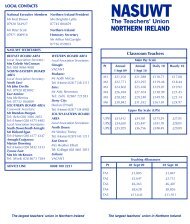
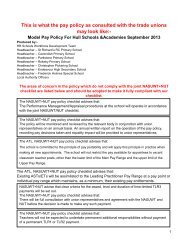
![Salaries (London & Fringe) 2012-2013 [pdf - 281 kb] - NASUWT](https://img.yumpu.com/47816007/1/190x112/salaries-london-fringe-2012-2013-pdf-281-kb-nasuwt.jpg?quality=85)